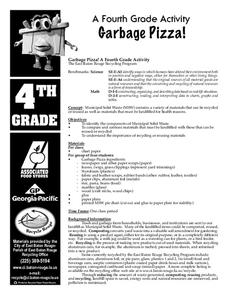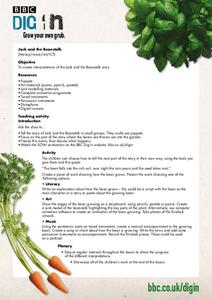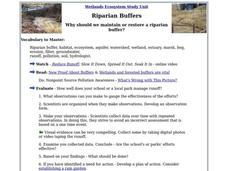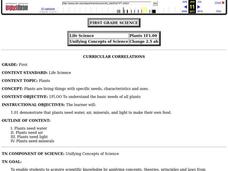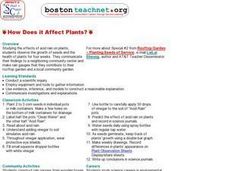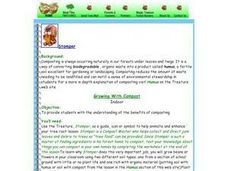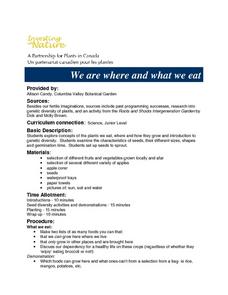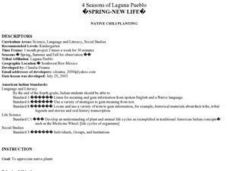Curated OER
Spring Word Search
In this spring activity worksheet, learners use the 50 words in the word bank to locate and identify them in the word search puzzle.
Curated OER
Searching for Spring ...
In this spring activity worksheet, students use the 30 words in the word bank to locate and identify them in the word search puzzle.
Curated OER
Spring Challenge
In this spring activity worksheet, students use the 79 words in the word bank to locate and identify them in the word search puzzle.
Curated OER
Let Us Grow Lettuce!
Students identify the stages of plant growth. In this plant instructional activity, students plant lettuce seed and take photos of the growth throughout a two week period.
Curated OER
Garbage Pizza
Fourth graders explore the concept of waste management. In this recycling lesson, 4th graders identify materials that must be landfilled as well as items that may be recycled or reused.
Curated OER
Jack and the Beanstalk
Students create a creative interpretation of Jack and the Beanstalk. In this artistic expression lesson, students paint the stages of the beanstalk plant as a storyboard and create song about how the seed is growing.
Curated OER
Burs in Your Furs
Students explore the concept of animal welfare. In this wild animal habitats instructional activity, students discover the work of wild animals in sustaining their habitats as they participate in a classroom simulation. Students discuss...
Curated OER
From One Seed Grow Many Seeds
First graders practice identifying plants by singing a song. In this plant life instructional activity, 1st graders sing the song "Parts of a Plant" which is based on the anatomy of sunflowers. Students discover agriculture...
Curated OER
Vermiculture Food Waste Compost Program for Touchstone School
Students explore the advantages of composting. In this recycling lesson students complete a worm compost project and collect food waste to feed them.
Curated OER
Riparian Buffers
In this riparian buffer worksheet, students click on the links to learn about why we should maintain the riparian buffer and answer short answer questions about it. Students answer 7 questions.
Curated OER
Decomposers- Nurse Logs
Pupils investigate temperate forest ecosystems. In this environmental lesson, students discover different forms of decomposition and its effect on the environment.
Curated OER
Medieval Millions
This PowerPoint enables students to review mathematical concepts that were addressed in fifth grade. This is an interactive review game where the class is divided into two teams. The team that answers the most questions right wins. Each...
Curated OER
Xeriscaping In Your Community
Fourth graders participate in a service-learning project to design landscaping that maximizes water use and utilizes indigenous plant species.
Curated OER
Plants
First graders explore the specific needs, characteristics, and uses of plants. They discuss the needs of plants as they grow. Students observe plants in various settings as they grow and note the changes they see.
Curated OER
How Does it Affect Plants?
Young scholars examine the effects of acid rain on plants. They observe the growth of seeds and the health of different plants for a month. They share their findings with the community.
Curated OER
PLANTING A TREE
Students study how to select the right tree for the right site, how to properly plant a tree, and how to mulch and water a tree.
Curated OER
Growing With Compost
Students discuss the positives and negatives of composting. They plant their own plant using composting material and record results. They create a poster for the classroom.
Curated OER
We are where and what we eat
Students explore concepts of plants they eat, where and how they grow and are introduced to genetic diversity. They examine seed characteristics, look at their different sizes, shapes and germination time. They also set up seeds to...
Curated OER
Indiana Ice Investigations
Fourth graders create a model of the formation of Indiana by glaciers. Working in groups with appropriate materials, they create a model documenting how glaciers moved through the land and formed the geological structure and land masses...
Curated OER
Birth, Growth, And Development
Pupils understand that all living things have a life cycle that includes being born, developing into an adult, reproducing, and eventually dying.
Curated OER
Native Chili Planting
Students discover the process of planting chili. After comparing two types of seeds students plant and with the use of a digital camera, record the seed progress. When ready for transplant, students take young plants to a retirement...
Curated OER
Think Green
Students experience and practice compositing and recycling through hands-on-activities. They distinguish between which items from their trash can be recycled, composted and reused. The process for making recycled paper is also covered in...
Curated OER
The Principles Of Composting
Students put items in a plastic bag and watch the effects of composting. While completing the experiment, students answer questions and ask permission to start their own compost pile at home.
Curated OER
Bean and Ozone Project
Students performed an experiment in which they grew beans in an ozone chamber and some in regular air in order to see if the ozone causes damage to the plants.






